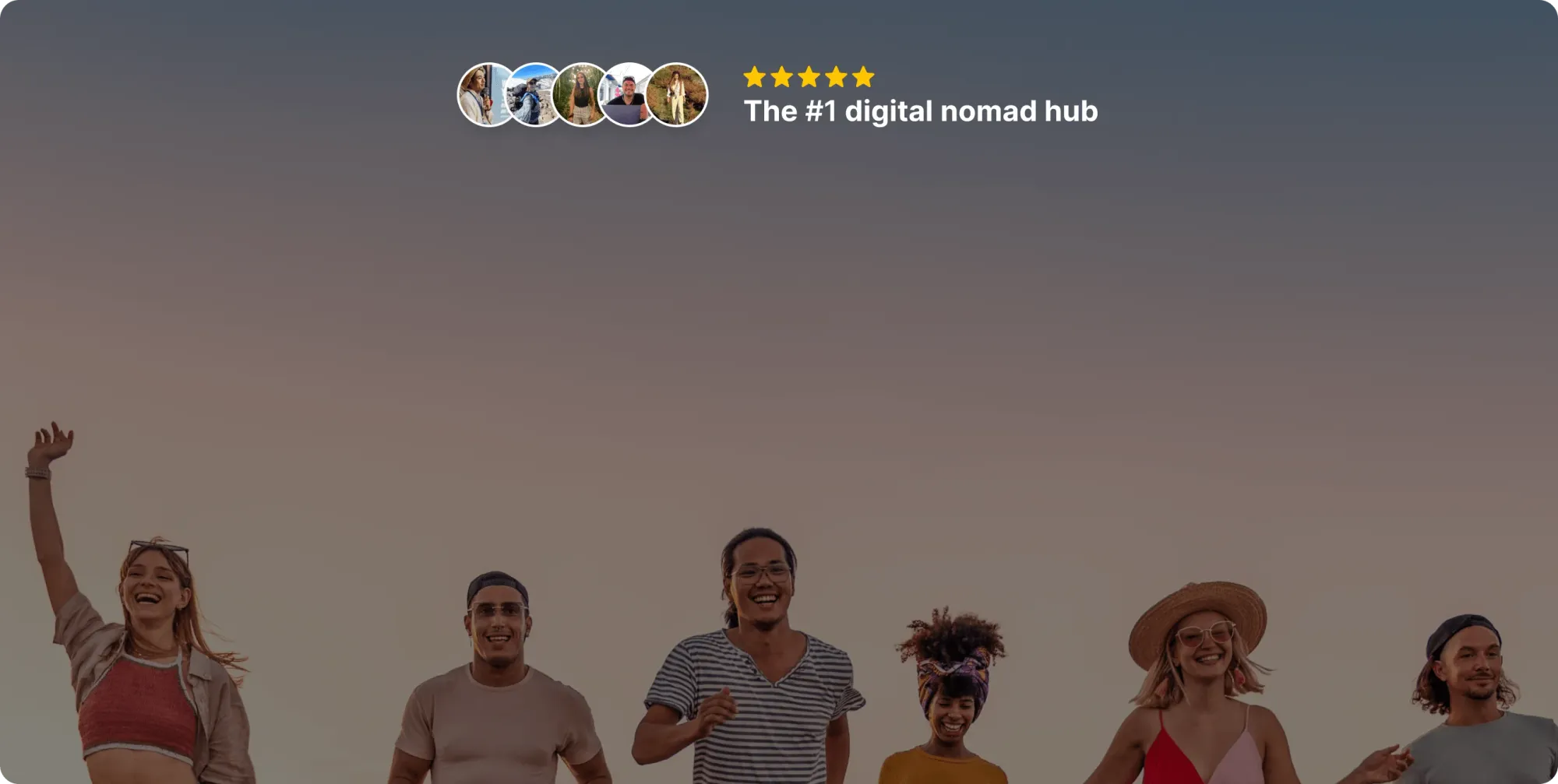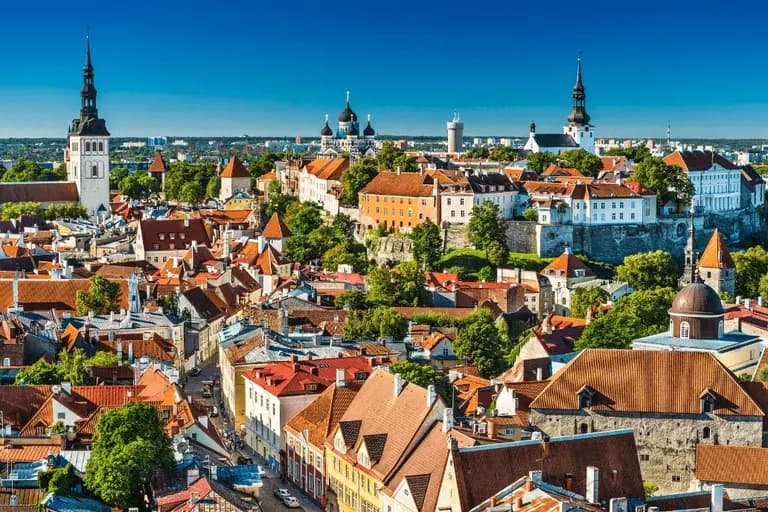Where to Stay in Cape Town as a Digital Nomad
Discover the best neighborhoods, coworking spots, and tips for digital nomads living and working smoothly in vibrant Cape Town.


If you’re thinking about working from Cape Town as a digital nomad, you’re definitely not alone. The views are incredible, there’s a growing remote work scene, and they even offer a digital nomad visa. But where you stay really matters.
I put together this guide to help you get the lay of the land, including the safest neighborhoods, the best laptop-friendly cafes, and coworking spaces where you can actually get stuff done.
One thing you have to keep in mind is safety. Not every area in Cape Town is remote-worker-friendly, so I’d suggest basing yourself in Sea Point. It’s safe, close to everything, and has good infrastructure. That said, I’ll also explore some other neighborhoods, since your needs might be different depending on what you’re after.
1. Sea Point: Best Overall
If you’re heading to Cape Town and want to stay somewhere that’s safe, walkable, and actually good for remote work, Sea Point is your best option, in my opinion. You’ve got the ocean right there, a long promenade that’s perfect for morning walks or runs, and everything you need within walking distance.
I stayed there for a few months, and honestly, it made day-to-day life super easy. Fast internet, cafés with backup power during load shedding, and I never once felt unsafe walking around, even early in the morning or after sunset.
Bootlegger became my go-to work spot (good coffee, Wi-Fi holds up), but Kanela and Jarryds are also great if you want to mix it up. All of them are laptop-friendly and have that casual “stay a while” vibe.
Rent isn’t the cheapest (about $1,370 USD) for a decent place, but for what you get, it’s worth it. Especially if you’re planning to stay more than a few weeks.
If you want ocean views, a bit of a social scene, and a reliable setup for remote work, Sea Point ticks all the boxes. I’d go back in a heartbeat.
2. Green Point: Best Amenities
Green Point is another solid choice if you want to stay central and have everything within arm’s reach. It’s super walkable: you’ve got gyms, grocery stores, cafés, live music spots, even ferries. All are just a few minutes away on foot. If you're willing to pay a bit more, you’ll get those leafy streets with private security.
Coworking-wise, you’re spoiled for choice here. Ideas Cartel, AfricaWorks, and WeWork80 are all based in the area, and they’re some of the top spots in Cape Town. If you prefer working from cafés, you’ve got a bunch of reliable options too. Shift, Pauline’s, and Bootlegger are all laptop-friendly and have backup power, so you’re covered during load shedding.
As for rent, expect to pay around $990 USD a month for a decent one-bedroom with parking. Most landlords will ask for two months’ deposit plus your first month up front, so just be ready for that. But once you're in, you can pretty much live without a car. Everything you need is... Right there!
3. De Waterkant: Best for Walkability
De Waterkant is one of my favorite little pockets in Cape Town. It’s basically a small, super walkable village tucked inside the city. If you’re someone who loves the idea of rolling out of bed and heading straight to a coworking space downstairs in your hoodie (or pajamas, like in my case), this is your spot!
Some buildings here, like Cape Quarte, actually have coworking spaces in the same building. You could literally live upstairs and work downstairs. Rent is roughly $830–$1,240 USD, and most places come with backup power, which is a lifesaver during load shedding.
There’s a strong laptop-friendly café culture too. On pretty much every block, you’ll find great spots like Coffee Roasting Co., Loading Bay, and Strangers Club.
De Waterkant is ideal if you want to ditch the car and still have access to everything: workspaces, good food, gym, nightlife, you name it. It’s safe, stylish, and low-key, one of the best areas for living for a flexible digital nomad life.
4. Tamboerskloof: Best Nature
If you're someone like me who needs nature and a view to function, Tamboerskloof is honestly the dream. It’s this leafy, quiet neighborhood right on the slopes of Lion’s Head, and you get full-on Table Mountain views pretty much everywhere you look. Every morning feels like a screensaver.
It’s super peaceful but still close enough to the city. The local go-to is The Blue Café. It’s been around since 1903, but it’s got solid Wi-Fi, outdoor seating with plugs (rare!), and it’s just a nice place to post up with your laptop. You’ll definitely end up working there more than you think.
If you need proper coworking spaces, there are plenty within a short walk or drive. Workshop17 and Craft+Graft are nearby, and most places have backup power, so you’re covered when load shedding hits.
Rent for a one-bedroom with fiber and generator backup usually falls between $825 and $1,235 USD, depending on the setup.
5. Gardens: Best Social Scene
Gardens is a great option if you’re the kind of person who likes being in the middle of everything. It sits just at the edge of the CBD and right under Table Mountain, so you're close to everything but not smack in the middle of the chaos.
I stayed here for a bit and loved how walkable it is. You’ve got Kloof Street basically as your main strip, full of laptop-friendly cafés like Truth Coffee, Molten Toffee, and loads of others where no one’s giving you side-eye for staying a few hours with your laptop. Most of them have backup power too, so even during load shedding, you’re fine.
Workshop17 is right there on Kloof, a really reliable coworking space with fast internet (200 Mbps) and proper office setups. Craft+Graft is just a short walk, too if you want a quieter spot to work from.
Rent’s not too bad either, I saw some really decent one-bed apartments going for around $825–$990 USD. Honestly, it’s cheaper than Sea Point but still super central, and you're close to everything: grocery stores, yoga studios, rooftop bars, whatever you're into.
Where NOT to Stay in Cape Town as a Digital Nomad (and Why)
Not everywhere that looks great on Instagram is actually a good place to live and work from. Camps Bay, Clifton, Bantry Bay, Observatory, and Woodstock all seem like dream spots at first glance. I totally get the appeal, but if you’re here to get work done, they can be a bit of a trap.
Camps Bay and Clifton are absolutely gorgeous, no doubt. But they’re mostly tourist playgrounds, and rent is crazy expensive for what you get. Plus, the internet can be spotty, and getting stuck in traffic there is a nightmare: there’s basically one way in and out.
Woodstock and Observatory are more artsy and cool, but I wouldn’t feel comfortable walking around with my laptop after dark. Some parts can feel a little sketchy, and coworking spaces aren’t super reliable.
Honestly, these places are awesome for day trips. Go check out the beaches, grab a sunset, and explore the street art. But for everyday life, they’ll drain your energy and make it harder to focus. Trust me, I’ve been there, and it’s way better to pick a neighborhood that’s safe, has good internet, and feels like a proper home base.
Your work (and sanity) will thank you!
Best Coworking Spots and Cafés in Cape Town for Digital Nomads
If you’re planning to work remotely here, the biggest deal is finding places with reliable internet and backup power. Load shedding is real, so you want spots that won’t leave you hanging.
My go-to coworking spaces with fast Wi-Fi and backup power:
- Workshop17 (Waterfront & Kloof Street): This place is reliable, with great internet and always power, which is a lifesaver.
- Ideas Cartel (Green Point/CBD): Chill vibe, day passes available, and they’ve got backup generators so you can keep grinding.
- Neighborhood Cape Quarter: They do coworking and coliving, which is cool if you want to meet other nomads.
- Craft + Graft: Awesome coffee, calm vibe, and a solid place to get work done without distractions.
Sometimes I just want to grab a coffee and work without any stress about power cuts. These are the cafés I used and liked:
- Bootlegger Coffee Company (Sea Point): Big spot right by the sea, perfect when you want some fresh air with your caffeine.
- Shift Espresso Bar (Green Point): Great espresso and a nice morning hangout spot.
- Loading Bay (De Waterkant): Small coffee boutique with outdoor seating and a quiet mezzanine upstairs... Ideal for focus mode!
- The Power and the Glory (Tamboerskloof): Coffee during the day, cold beers at night. Loved working here and then chilling later.
- Knead Bread (Gardens): On Kloof Street, famous for sourdough and the sidewalk vibe, perfect for people-watching while working.
Cost of Living in Cape Town for Nomads
Here’s roughly what I spent living in Cape Town:
- Rent for a one-bedroom: about $985 USD a month
- Food and groceries: around $275 USD, enough to cook most meals and grab a few meals out
- Coworking membership: about $110 USD per month
- Mobile data (eSIM): $26 USD for 10GB, which lasts the month
- Uber rides: if you take them regularly, expect around $80 USD monthly
- Insurance: this varies, but don’t skip it!
If you’re earning in dollars or euros, Cape Town seriously gives you a great lifestyle, all while spending way less than cities like Lisbon or Barcelona.
Practical Tips for Living in Cape Town as a Digital Nomad
- Safety: As anywhere else, just use common sense! Don’t walk around at night, grab an Uber or Bolt instead, and try not to flash expensive phones or gear when you’re out.
- Load shedding: It can be annoying, but there’s an app called EskomSePush that tells you exactly when the power’s going off in your area. Super handy to avoid surprises.
- SIM cards and data: If you want to get online fast, Holafly is easy to set up and works in minutes. Or you can get pay-as-you-go data from Airalo starting at around $4.50 for 1GB.
- Best time to visit: If you want sun and beach days, come between December and March. Winters (May to August) are cooler and wetter—and cheaper—but heads up, there’s usually more load shedding then.
Ready to Live and Work in Cape Town as a Digital Nomad?

Join our global
digital nomad community
Join us for free
Freaking Nomads is supported by you. Clicking through our links may earn us a small affiliate commission, and that's what allows us to keep producing free, helpful content. Learn more
Read Next


The Ultimate Guide to Being a Digital Nomad in Italy


Estonia Digital Nomad Visa: Eligibility and How to Apply


